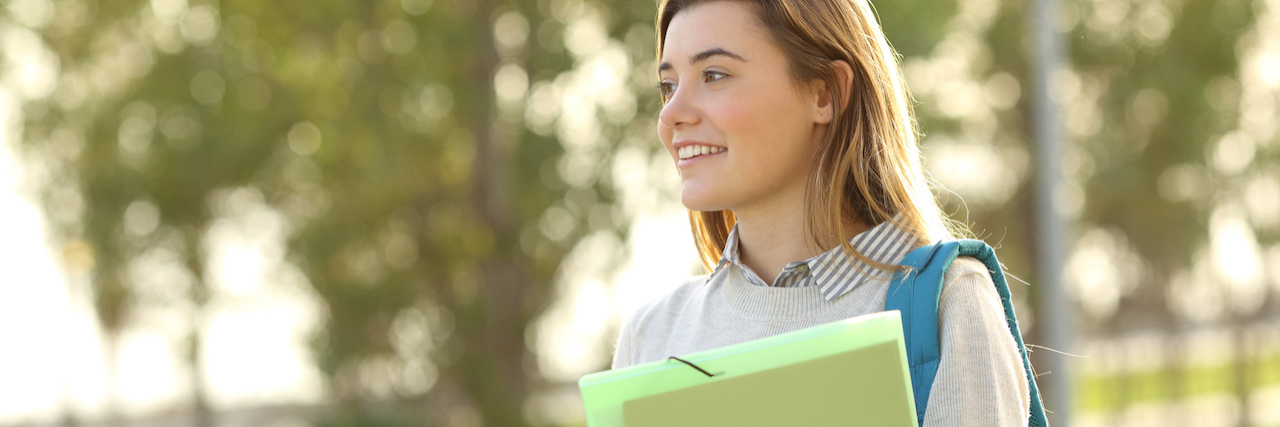This week (February 4-8) is Feeding Tube Awareness Week.
There are hundreds of reasons one might need a feeding tube placed. For me personally, it became necessary due to complications from ehlers-danlos syndrome and dysautonomia. I rely on my jejunostomy tube for nutrition, hydration and medications.
• What is Ehlers-Danlos Syndrome?
• What Are Common Ehlers-Danlos Syndrome Symptoms?
Having a feeding tube isn’t always a walk in the park — it can be downright annoying and sometimes incredibly painful. But this little plastic thingamajig protruding from my abdomen has given me so much of my life back. I feel blessed to be a “tubie!”
But I haven’t always been so excited to embrace that title…
Last year during Feeding Tube Awareness Week, my mom asked, “So is this week just to spread awareness that feeding tubes exist?” I laughed and filed it away, not really sure how to respond.
But this year, I have an answer. And it comes from an objectively insignificant but pivotal interaction with a person who would become my favorite professor.
My surgical feeding tube was placed in June of 2015. During my first full semester at North Caroline State University — spring of 2016 — I took an introductory human nutrition class. And the final project that would dictate 22.5 percent of our grade in the course? A food diary.
Before that point, I could hide my differences under my shirt. Sure, I was leashed to a backpack, but zipped up, it concealed my secret. I could pretend. Ignore it. But this assignment forced me to acknowledge that I didn’t eat and that my experience differed from the norm.
My anxiety grew as the deadline inched closer. At the time, my reliance on “artificial” nutrition felt like a personal failure. And honestly? I was absolutely riddled with shame.
I remember standing in line to speak with my professor after class, trying not to visibly shake. When everyone else had filed out of the room, it was time for the moment of truth. I took a deep breath…
“Hi, I kind of get my nutrition through tubes and stuff and don’t eat food and so I don’t really know what to do about this food diary…” (Throw in like three or four more variations of “sorry” and that’s what I came out with.)
Her two-word reply has stayed with me to this day: “Oh… OK.”
It may seem silly to get hung up on such a short exchange, but hear me out. Up until this point, I was painfully aware of how any mention of my feeding tube made people uncomfortable. Most stumbled over some kind of response that usually involved me needing to reassure them that they don’t have to be sorry for asking questions or about my circumstance. Some were disgusted or even afraid.
But, “Oh, OK”? Casual and unfazed? That was a first.
And just like that, she passively challenged me to re-evaluate my perception of poor health as a reflection of poor character. I let down my defenses. And I’ve been on a journey toward self-acceptance ever since.
It has been a long road and I still have days where I’d rather hide, but I have learned to accept my differences and be thankful for the tools that keep me alive.
Share advice, support and connect more easily with other chronic illness warriors by downloading our free app.
So back to the question: is this week just to spread awareness that feeding tubes exist? Pretty much. Awareness is an important first step…
But I also embrace opportunities to demystify enteral and parenteral nutrition so that others who rely on “weird” medical devices and tools can, too, be met with an, “Oh, OK.”
“Oh, OK” strips away the shame and opens the door for self-acceptance. Self-acceptance is freeing and paves the way toward empowerment. And that, my friends, is something worth celebrating.
So, happy Feeding Tube Awareness Week! Make the best of the life you’ve been given. You, too, can learn to love yourself — scars, tubes, lines, bags, mobility devices and all.
Getty image via AntonioGuillem

